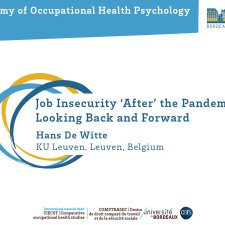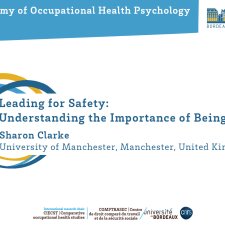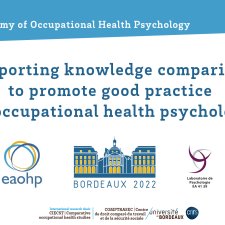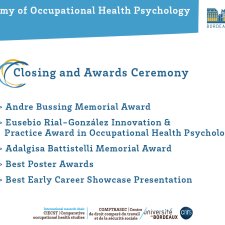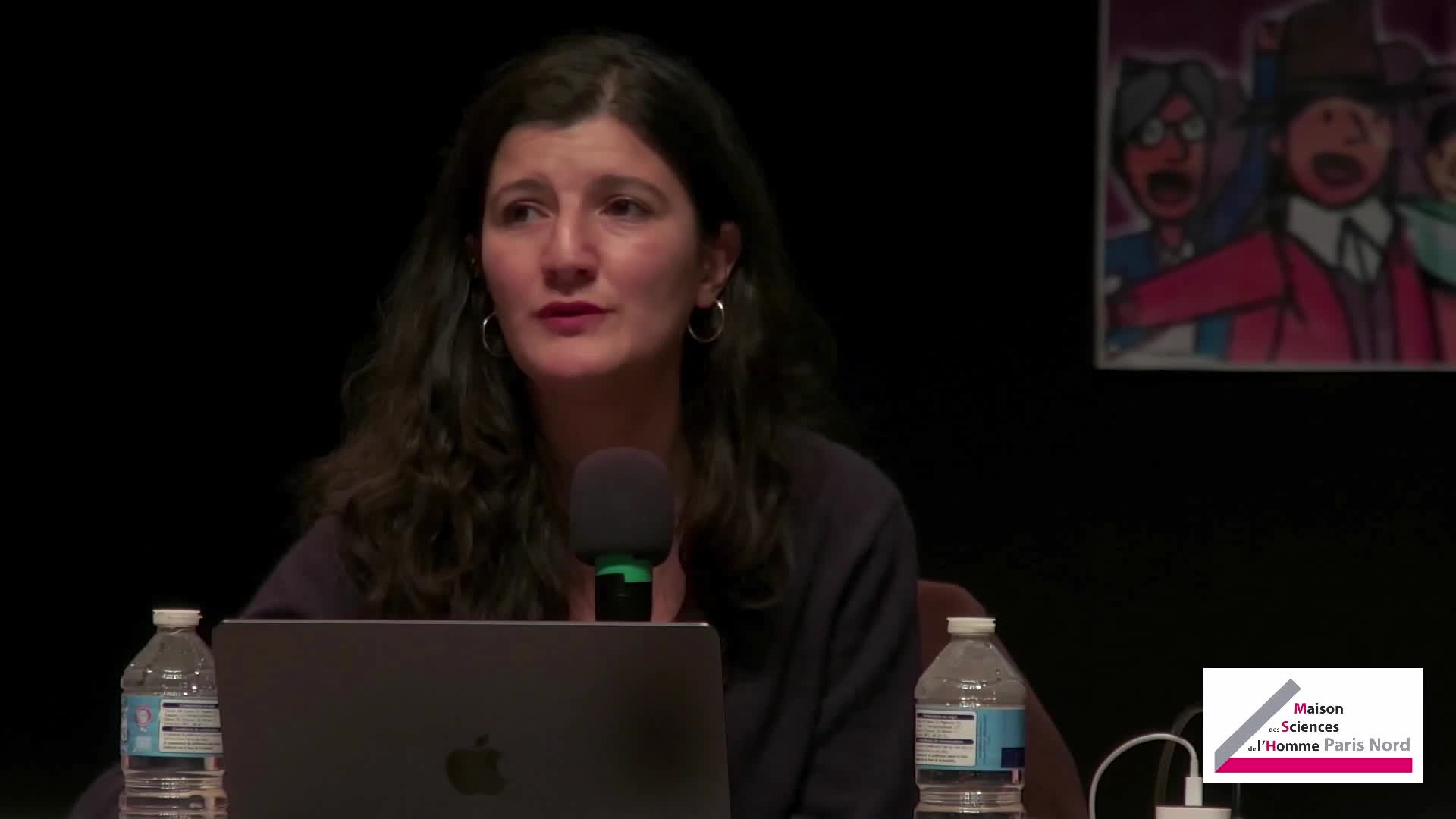Notice
Employee Workaholism, Affective Commitment, and Well-Being: The Role of Work Context, Individual Dispositions, and Need Satisfaction
- document 1 document 2 document 3
- niveau 1 niveau 2 niveau 3
Descriptif
The proportion of employees working long hours is on the rise, due to economic or psychological reasons. This results in employees developing various forms of attachment or commitment to work-related targets and even addictive behavior (e.g., workaholism). Given the importance of work involvement for individuals’ life, it is not surprising that employee commitment to the workplace and obsessive attachment to work have consequences for employee well-being. However, the mechanisms and boundary conditions that are associated with employee commitment and work involvement and how they relate to well-being remain poorly understood. In this keynote address, I provide examples from my own research pointing to the importance of contextual factors, individual difference variables, and psychological mechanisms to explain the association between employee commitment and work involvement with their antecedents and well-being.
First, while much research has previously considered workaholism, a psychological syndrome that combines working long hours and obsessive thoughts about work, to be driven by personality traits such as negative affectivity, perfectionism, or type A personality, a study by my research team demonstrates that contextual factors play a significant role in the development of workaholism. Specifically, high-quality relationships with supervisors, which generally do not push employees toward adopting workaholic habits, may do so when these relationships develop in the context of an overwork culture in the organization, thereby indirectly leading to increased employee strain. This research illustrates the importance of contextual factors as triggers of workaholism and strain.
Second, research has rarely examined how employee commitment to the organization relates to work stressors from a dynamic perspective. One perspective would be to expect organizational commitment to increase employees’ exposure to work stressors while the reverse perspective would predict that work stressors reduce organizational commitment over time. Our data provide support to the first perspective. Specifically looking at the longitudinal relation between affective commitment and role overload (i.e., a hindrance stressor reflecting work situations where the employee has too many tasks to accomplish given the resources available), we found that affectively committed employees experienced an increased workload over time due to satisfying their need for autonomy. Moreover, this process was amplified among individuals with a strong individual self-identity, as they are guided by self-interest and personal achievement. All this happens because affectively committed employees tend to define their job responsibilities more broadly than others.
Third, in a separate study, we asked the question “is affective commitment always good?” While the benefits of affective commitment have been widely supported in studies among newcomers and low-tenured employees, the evidence from long-tenured employees is less clear. We explored this question and demonstrated that there were diminishing returns associated with affective commitment when employees have worked for an organization for a long period of time. This resulted in affective commitment relating to weaker increases in employees’ satisfaction of their needs for autonomy and relatedness, indirectly contributing to maintain emotional exhaustion at higher levels.
In conclusion, contextual variables, employee dispositions, and need satisfaction are important factors to consider when examining the drivers of workaholism and how employee commitment to the organization relates to role stress and well-being.
>> Christian Vandenberghe, HEC Montreal, Canada
Intervention / Responsable scientifique
Dans la même collection
-
Job Insecurity ‘After’ the Pandemic – Looking Back and Forward
De WitteHans15th European Academy of Occupational Health Psychology Conference 6-8 July 2022, University of Bordeaux, France The theme for the 2022 conference is ‘Supporting knowledge comparison to promote good
-
Leading for Safety: Understanding the Importance of Being a Leader
ClarkeSharon G.15th European Academy of Occupational Health Psychology Conference 6-8 July 2022, University of Bordeaux, France The theme for the 2022 conference is ‘Supporting knowledge comparison to promote good
-
EAOHP 2022 / Opening ceremony
LerougeLoïcLekaStavroulaMacéÉricMartinPhilippeLannegrand-WillemsRoely-Ida LydaMainguenéMarcDeprezGuillaume15th European Academy of Occupational Health Psychology Conference 6-8 July 2022, University of Bordeaux, France The theme for the 2022 conference is ‘Supporting knowledge comparison to promote good
-
EAOHP 2022 / Closing and Awards ceremony
TeohKevinDeprezGuillaumeLerougeLoïc15th European Academy of Occupational Health Psychology Conference 6-8 July 2022, University of Bordeaux, France The theme for the 2022 conference is ‘Supporting knowledge comparison to promote good
Sur le même thème
-
Podcast 1/4 d'heure avec : David Chapron, enseignant-chercheur au Laboratoire Matériaux optiques, …
ChapronDavidRencontre avec David Chapron - enseignant-chercheur au LMOPS (Laboratoire Matériaux optiques, photonique et systèmes).
-
00. Des comptables et des conteurs (Présentation avec Jean-Philippe Pierron)
PierronJean-PhilippeIntroduction à la série de podcasts "Aux Grands Remèdes les Petits Mots".
-
02. Faire de son mieux (Avec Nathalie Vallet-Renart)
Vallet-RenartNathaliePodcast animé par Romain Poncet, ingénieur de recherche en sociologie.
-
-
-
01. Le soin du détail (Avec Emilie Chanel)
PoncetRomainChanelEmilieCe podcast est proposé par la Chaire Valeurs du Soin, animé par Romain Poncet, ingénieur de recherche en sociologie.
-
-
05. Se plier en quatre (avec Marie Soulhac)
SoulhacMariePoncetRomainAnimation : Romain Poncet, ingénieur de recherche en sociologie.
-
-
-
03. Soignants ou Soi-Niant (Avec Sonia Benkhelifa)
BenkhelifaSoniaAnimation : Romain Poncet, ingénieur de recherche en sociologie.
-
Colloque international « (In)justice reproductive : Les droits reproductifs au prisme des rapports …
CarayonLisaSantos RodriguezVictorDans cette vidéo, Lisa Carayon anime une table ronde portant sur les enjeux de justice reproductive et de travail.


